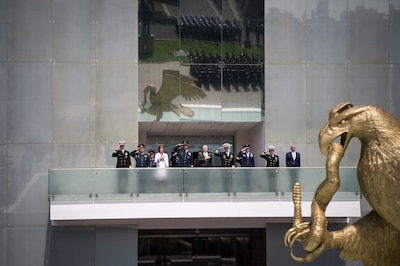By Cheryl Pellerin DoD News, Defense Media Activity
WASHINGTON, Sept. 19, 2017 — U.N. Security Council sanctions
targeting North Korea’s missile and nuclear tests are working, Defense
Secretary Jim Mattis said yesterday during an informal briefing with members of
the press.
The secretary said the sanctions, which began in 2006, have
shown North Korean leader Kim Jong Un that there’s a penalty to pay for
ignoring international concerns and norms.
“We are putting the leader in North Korea in a position to
be aware of -- [with] the international community voting unanimously twice now
in the United Nations Security Council -- … the increasing diplomatic isolation
that comes with the economic sanctions,” Mattis said.
Under Pressure
The secretary made a Sept. 15 trip to Mexico City to
strengthen the bilateral defense relationship and participate in Mexican
Independence Day activities, and to the reporters he said that Mexico had
declared the North Korean ambassador a persona non grata.
On Sept.7, according to an official press release, Mexican
President Enrique Peña Nieto issued an executive order instructing all
government agencies to comply with new UNSC economic sanctions imposed on North
Korea. The same day, the Mexican government gave North Korean Ambassador Kim
Hyong Gil 72 hours to leave the country.
Spain, Peru and Kuwait, according to news reports, also have
ordered North Korean ambassadors and envoys out of their countries.
“That's an example of what is working,” Mattis said. “It's a
pressurization effort to raise the cost” to Pyongyang of continued testing of
missiles and nuclear weapons.
Responding to Provocations
Since January, North Korea has tested five ballistic
missiles and a nuclear weapon, and reporters asked Mattis why the United States
doesn’t shoot the missiles down.
“Those missiles are not directly threatening any of us,” the
secretary said.
Japan and U.S. missile defenses and radars are operating, he
added, and North Korea is intentionally initiating provocations “that seem to
press against the envelope for just how far can they push without going over
some kind of a line in their minds that would make them vulnerable.”
So they aim for the middle of the Pacific Ocean, Mattis
said, “where at least we hope no ships are around.”
The bottom line, he said, is that if the missiles were a
threat to Guam or Japan, “that would elicit a different response from us.”
Mattis noted that there are military options that would not put South Korea at
grave risk, but declined to explain further.
“We will defend ourselves, our interests [and] our allies,”
he said, “and we work together very transparently and openly with our allies.”










